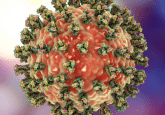Can SARS-CoV-2 variants cause different long COVID symptoms?

An observational study of long COVID patients in Italy revealed that different neurological and emotional symptoms were reported between people who contracted different strains of SARS-CoV-2.
Recent research, conducted collaboratively between the University of Florence and Careggi University Hospital in Italy, to be presented at the European Congress of Clinical Microbiology & Infectious Diseases in Lisbon, Portugal (23-26 April), suggests that infection with different variants of SARS-CoV-2 induces different long COVID symptoms.
As we progress through the pandemic, we are learning more about SARS-CoV-2 infections every day, however long COVID remains poorly understood. Many survivors of SARS-CoV-2 infection, including those who suffered severe and mild infections, report experiencing post-acute sequelae of COVID-19, more commonly known as long COVID.
“Many of the symptoms reported in this study have been measured, but this is the first time they have been linked to different COVID-19 variants”, said Spinicci.

Exercise would help moderate the effects of Long COVID
Exercise may be the key to treating the sequelae of Long COVID by supporting brain homeostasis, increasing insulin sensitivity, and mediating the inflammatory response.
Led by Michele Spinicci, the team conducted a retrospective observational study of 428 patients (254 [59%] men; 174 [41%] women) who were treated at the Careggi University Hospital’s post-COVID outpatient service between June 2020 and June 2021. During this time, both the original form of SARS-CoV-2 and the Alpha variant were circulating in the population. The patients who had previously been hospitalized with COVID-19 completed a questionnaire on their persistent symptoms at the outpatient center around 7 weeks after hospital discharge. Alongside the questionnaire, the study looked at electronic medical records pertaining to medical history, patient demographics, microbiological and clinical COVID-19.
The team found that 76% of patients reported at least one persistent symptom, the most common of which were shortness of breath (37%) and chronic fatigue (36%) followed by sleep problems (16%), visual problems (13%), and brain fog (13%) retrospectively.
Interestingly, the study revealed that people who originally suffered a more severe SARS-CoV-2 infection and subsequently required immunosuppressant drugs such as tocilizumab, were six times more likely to report long COVID symptoms. Similarly, those who received high-flow oxygen support were 40% more likely to experience long COVID. The team also reported that women are almost twice as likely to report long COVID symptoms in comparison to men.
A surprising finding from the analyses was that people already diagnosed with type 2 diabetes seemed to have a lower risk of developing long COVID symptoms. The authors argue further studies are needed to understand this unexpected finding.
Long COVID symptoms reported in the group infected when the original SARS-CoV-2 variant was dominant were substantially different from those reported by patients infected when the Alpha variant was dominant. Reports of myalgia, insomnia, brain fog, anxiety, and depression were significantly higher in the group infected when Alpha was dominant, while loss of smell, difficulty swallowing, and impaired hearing were less common.
“The long duration and broad range of symptoms remind us that the problem is not going away, and we need to do more to support and protect these patients in the long term. Future research should focus on the potential impacts of variants of concern and vaccination status on ongoing symptoms,” explained Spinicci.
As the analyses were drawn from an observational study, the authors acknowledge that the results do not prove cause and effect. The authors also mention the limitations of conclusions drawn as there is no record of which variant caused the infection in different patients.





